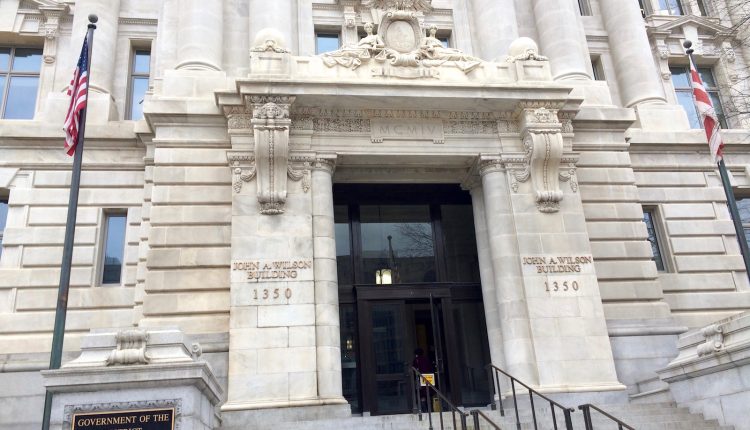Edward Cowan: Council members seek ‘mansion tax’ in latest sign of their steady appetite for more revenue
As if DC Mayor Muriel Bowser’s proposed 8.2 percent hike in government spending for 2020 were not large enough, two DC Council members hope to obtain more revenue from a tax increase on so-called mansions: residential properties with assessed valuations exceeding $1.5 million.
Council members David Grosso (at-large) and Brianne Nadeau (Ward 1), who proposed the mansion tax, opted not to insert it into the fiscal year 2020 budget, which the council approved Tuesday. Most likely, they held their fire because they don’t currently have enough votes and are waiting for a more auspicious occasion.
Introduced this month, the bill has been referred to the Committee on Finance and Revenue, whose chair — Ward 2’s Jack Evans — dislikes the idea and hasn’t yet scheduled a hearing. But if the campaign to recall the scandal-tainted Evans (that is, to remove him from the seat he has held since 1991) is successful — a big if — and someone else becomes the committee’s chair, the outlook could change.
Here is how the bill, if enacted, would work: The present tax rate on residential properties is $0.85 per $100 of assessed value in excess of the homestead exemption for owner-occupied homes. The exemption is $74,850. That much of assessed value is not taxed, an annual savings of $636.23.
The Grosso-Nadeau surtaxes would kick in as follows: On assessed value above $1.5 million, the rate would be $1.25 per $100. On value above $5 million, the rate would be $1.50.
An authoritative, unofficial estimate is that this mansion tax would generate $30 million a year of revenue, initially. That sum would grow as property values rise.
Wards 3, 2 and 6 would be hardest hit (in that order). That has to give pause to the members who represent those wards — Mary Cheh, Evans and Charles Allen, respectively. Indeed, some Ward 3 residents report Cheh has told them that she opposes the bill.
It is a soak-the-rich bill that would generate more displeasure than applause, especially among homeowners who would feel the bite, immediately or later as property values rise.
The Grosso-Nadeau proposal is symptomatic of the council’s appetite (and the mayor’s) for ever more revenue to spend, and of the stealthy real property tax increases that the council has allowed to take effect — with no vote. The tax bite on homes rises as assessed values go up — unless council reduces the tax rate. It has not done that since 2008.
Why not? Two reasons: first, the council’s quest for ever more spending and, second, the fact that there has been little grassroots clamor for relief from rising residential property tax bills. (The council has adopted some tax relief for seniors who meet an income test. A bill to increase the homestead exemption was shelved earlier this year.)
Grosso’s desire for more revenue to spend is a matter of public record. At a March 15, 2018, meeting in Cleveland Park on his proposal for a “public” bank, Grosso said he thought council should be allowed to spend from the reserves the District has been accumulating (the “rainy day fund”) from annual revenue surpluses.
In a press release, Grosso gave a curious rationale for raising taxes on homes assessed at $1.5 million and up. “D.C. has experienced tremendous economic growth in the past decade, but not everyone has shared in that prosperity,” he said. “My proposal makes our property tax structure more equitable by increasing the rates on those at the top.”
These two statements in his release amount to a non sequitur. The first sentence describes a fact of life, that not all DC residents (or Americans anywhere) have benefited from economic growth. The second sentence is not logically related to the first. It asserts that higher rates on high-value homes would be “more equitable.” That is not a statement of fact; it’s a judgment based on political values. It is a proposition that merits full-throated public debate in the council, as part of a broad examination of how the District taxes owner-occupied homes.
Grosso might contend that his two surtaxes would make taxation of residential property more “progressive.” That might be a more plausible assertion if his bill also lowered rates for less valuable properties so that it was revenue neutral, and if it made residential taxation less onerous for older people whose incomes have not kept up with property values.
One other element of the Grosso-Nadeau proposal merits close scrutiny. It would earmark, indefinitely, half of the surtax revenues to implement the Birth-to-Three for All DC Act (an amalgam of child development programs) and the other half to expand school-based mental health supports.
These may be worthy causes, but there is no reason they should be given their own dedicated stream of tax revenue, thereby removing them from annual review and appraisal within the budget process. These programs should be reviewed and re-evaluated from year to year, like other elements of the budget. That’s what a budget process and a local council are for.
Edward Cowan, a retired New York Times economics writer, has been a resident of the District for 47 years.
About commentaries
The DC Line welcomes commentaries representing various viewpoints on local issues of concern, but the opinions expressed do not represent those of The DC Line. Submissions of up to 850 words may be sent to editor Chris Kain at chriskain@thedcline.org.



What baloney! The Council still ignores the low-hanging fruit: the big Trump tax cut wealthy are getting. $hundred of millions of added revenue could be generated by raising these residents’ DC income tax rates, as called for by the Fair Budget Coalition. This should go to reducing DC’s shockingly high racial and economic disparities, especially child poverty and homelessness.